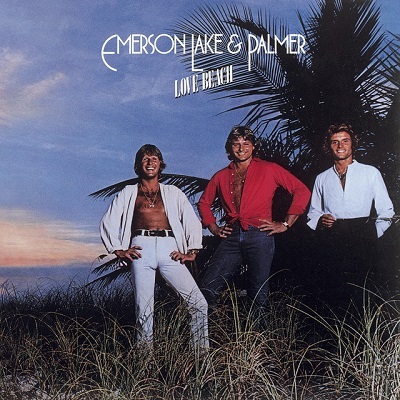Although Greg Lake looked me directly in the eye and assured me, “I hate that bloody album,” when I asked if the just reunited 1992 version of ELP would be playing any cuts from that record that must-not-be-named among Emerson, Lake & Palmer fans, still, I do love me some Love Beach.
I was doing the backstage hang with Emerson, Lake & Palmer at a rehearsal the night before their tour’s opening show, a one-off they were playing at Philadelphia’s Tower Theater. Come to worship with a scant few hundred at the altar of which will always be my personal Father, Son and Holy Ghost of Prog, I was hoping beyond all hopes that maybe we’d get a tickle of anything from the band’s much maligned seventh album.
I took it Mr. Lake was speaking for the whole band this night. My beloved ELP, pretty much exhausted and broke from lugging an orchestra with them on their 1977 Works World Tour, (and making up dates as a three-piece only during it to get money back in the coffers) probably should have demurred from Atlantic Records’ head Ahmet Ertegun when he urged them back into the studio. Ertegun wanted ELP’s 7th album they owed Atlantic to be a more commercial affair and all but pushed the trio back into recording.
But as Carl Palmer has remarked about his band’s history at this time, “We were done, put it on the shelf.”
Love Beach shows ELP’s lack of singles-creation ability as well as how in sync they were not at the time. Still, there is enough good here that I believe Love Beach deserves Lost Gem inclusion.
To defend myself, let’s ignore the often lambasted, first side of this album. Sure, a “Lucky Man” or “From The Beginning” rate among the band’s shorter-form, radio-friendly hits. But those songs came from Emerson, Lake & Palmer organically. And in the case of their first and arguably their most mainstream single, “Lucky Man,” Greg Lake brought the song in for his fellows to embellish, a tune he had written at the ripe old age of twelve. But as is evident on five out of six songs on the album’s first side, my ELP guys are not at their best trying to retrofit their sound to forced singles.
“All I Want Is You,” has a passable love song-y musical flow, but the lyrics are cringe-worthy, I shan’t even discuss the title track (ick!) the stab at sexual tease of “Taste Of My Love,” (the #MeToo movement would have a field day here!) and while “The Gambler,” is kind of fun and I like Lake’s overdriven guitar on “For You,” there really is nothing here save the last instrumental, “Canario.” Here we get Keith Emerson reworking of an instrumental from the longer “Fantasía Para Un Gentilhombre (Fantasia For A Gentleman)” concerto written by Spanish composer and pianist Joaquín Rodrigo Vidre. Making for one of the best, and surely the last of solid Emerson, Lake & Palmer instrumentals, this is a song I have seen Carl Palmer perform with his trio and it soars.
It’s side ‘B’ side of Love Beach, the 20-minute plus, four-part “Memoirs Of An Officer And A Gentleman,” suite mini concept that lifts the album. The story of a soldier facing deployment into World War II from his U.K. home, the suite continues with the ravages that war takes on the narrator’s life, specifically as it affects him and his fiancée. Emerson, Lake & Palmer was a band known for concepts, from the “Tarkus” suite on the first side of their 1972 album of the same name, the three parts of their very popular “Karn Evil 9” trilogy from what is arguably their most popular album Brain Salad Surgery, and their reworking of Russian composer Modest Mussorgsky’s “Pictures At An Exhibition,” on their cleverly-entitled Pictures At An Exhibition live album. Where those pieces explored sci-fi tropes and the weird interplay between the divine and man, with lots of synthesizer bombast, “Memoirs of an Officer and a Gentleman” deals with everyday folk and a bit of history, with gentler instrumentation, mainly piano. I feel this side features some of Greg Lake’s best singing (actually his voice sounds wonderful all throughout Love Beach) and some genuinely superb Keith Emerson ivory tickling.
“Memoirs Of An Officer And A Gentleman” also marks the last significant piece of music from my favorite band as far as I’m concerned. This fabulous suite begins with “Prologue/The Education of a Gentleman,” offering slow piano and Lake’s dulcet tones. The band hits its stride a few moments in, chugging along with a mid-tempo, march-like presentation. Emerson’s synth keyboard cuts through like a stirring trumpet with its distinct melody, and Palmer rolls a backbeat as Lake growls through “The Education Of A Gentleman” second half.
It’s on the second, B part of this quartet of tunes, where we hear Emerson at his most notable, running scales up and down the piano, with Lake singing some of his last real romantic balladeering about meeting his “Love At First Sight.” To hear just the simple combination of Lake singing and Emerson playing piano makes this part of Love Beach alone worthy of mention. After Emerson manages his expert solo, Lake follows with some perfectly plucked acoustic, then, we are set up for Palmer. He doesn’t disappoint — floating in with simple snare and light tom work at the nine-and-half-minute mark. This is truly the highlight for me across “Memoirs Of An Officer And A Gentleman.”
“Letters From The Front” starts with Palmer setting up the beat with Emerson’s electric piano and synth arpeggio lead following. It’s the heaviest the trio gets on “Memoirs,” and it’s not really all that heavy. The instrumental interlude here that fronts the song is reminiscent in sound and spirited interplay to parts of “Pirates,” another great longer piece of ELP music from the band’s Works Volume 1 album. The song chugs along as Lake ‘reads’ the letters his love has sent him while he’s “moving out to the front.” The young soldier’s future suddenly ends in a swirly synth as we are led into watery keys arpeggiation and Palmer tom work under Lake’s lower-toned reading of a sudden, unexpected tragedy. Our narrator, now a heartbroken shell of a man due to the sudden death of his love, makes his ironic declaration that he indeed now knows what it means to be an officer and a gentleman.
Emerson’s flute-sounding synth with Palmer’s marching snare and Lake’s subtle bass informs the last part of the suite, “Honorable Company (A March).” The band builds a stirring rise over the main keyboard riff for just a tickle over three minutes, very much like they do on the last song on their Trilogy album, “Abaddon’s Bolero.” Yes, it’s yet another instrumental from this band, harkening back to better times for this trio and a great way to end Love Beach.
A year to the month after Love Beach was released, the single live album Emerson, Lake & Palmer in Concert was released. In my naïve18-year-old enthusiasm I figured this unexpected release, plus Love Beach before it, had to mean my favorite band was going to make it into the nearing 80s. ELP though, had in fact broken up.
Man, do I miss me my Emerson, Lake & Palmer, as much as the times in which the music they made was so popular. Luckily, we all have their music, which indeed includes the brilliant B-side of Love Beach that relegates the album into gem status for me.
~ Ralph Greco, Jr.




















